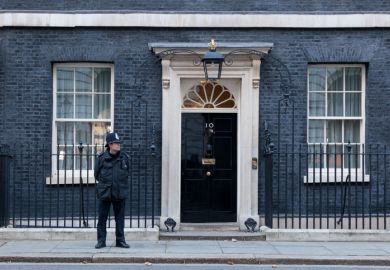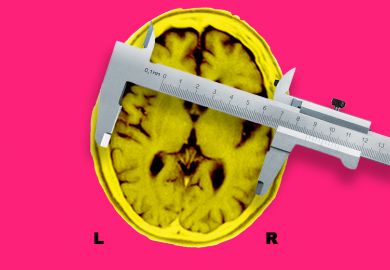Cutting existing research budgets by more than £1 billion to pay for association to Horizon Europe would represent an “existential threat” to UK science, Nobel laureate Sir Paul Nurse has warned.
Sir Paul, who is director of the Francis Crick Institute, Europe’s largest biomedical research centre, told Times Higher Education that he feared the UK’s research sector could be devastated by an unprecedented series of cuts, leading to the loss of thousands of scientists and researchers.
It follows growing concern over the government’s lack of clarity on how it will fund the costs of UK association to the European Union’s research and innovation programme, Horizon Europe, likely to be in the region of £1 billion to £2 billion, which has led to fears that the money will come from current research council budgets.
That potential cut of about £1 billion annually would follow a £330 million a year hit to medical research caused by the collapse of charitable fundraising during the pandemic and a 70 per cent cut to grants (about £300 million) that used money provided by the UK’s aid budget, following the government’s decision to abandon its pledge to spend 0.7 per cent of gross domestic product on overseas development aid, explained Sir Paul on the possible “triple whammy” to science funding.
“If you were to lose about £1.5 billion, it would be an existential threat to scientific research,” he said, adding that a £1 billion cut alone would mean the loss of some 10,000 fully funded scientists.
“I can’t recall such a cut in my lifetime and would be all the more incongruous when the government’s message is that it wants us to become a science superpower – there is a complete disconnect between rhetoric and reality, it seems,” said Sir Paul, a former Royal Society president who won the Nobel Prize for medicine in 2001.
“Any cut of this size would…put the government’s entire strategy of using science to drive innovation and develop the economy, and as a form of global outreach and soft power, into jeopardy.”
Sir Paul, whose 2015 review of UK research funding led to the creation of the research umbrella body UK Research and Innovation (UKRI), whose budget now faces drastic cutbacks, said the uncertainty stemmed from the budget’s failure to identify the source of Horizon Europe’s funding.
“They have not thought this out and I would be astonished if, once they saw the magnitude of this huge cut in the public funding of science, they didn’t come to their senses,” said Sir Paul.
That said, UK science was already under considerable pressure given the impact of the pandemic on finances, in particular the estimated £1 billion drop in income from medical research charities forecast over the next three years, said Sir Paul, who added that appeals for state support from medical charities had not yet led to any offers of help.
“Starting next week, the Crick will lose some £20 million it would normally receive from Cancer Research UK [CRUK] and the aid cuts will also affect a network we run to train African scientists with a focus on infectious diseases – it’s my assumption that we’ll have to abolish that, which means another couple of million pounds lost,” he said, adding that the potential impact on UKRI of Horizon Europe cuts could mean further reductions in funding.
“If I’m looking at a £25 million to £30 million a year reduction in funding for an organisation whose core CRUK and UKRI-MRC funding is £105 million, it is highly significant and extremely difficult to manage,” he said.
Register to continue
Why register?
- Registration is free and only takes a moment
- Once registered, you can read 3 articles a month
- Sign up for our newsletter
Subscribe
Or subscribe for unlimited access to:
- Unlimited access to news, views, insights & reviews
- Digital editions
- Digital access to THE’s university and college rankings analysis
Already registered or a current subscriber?








